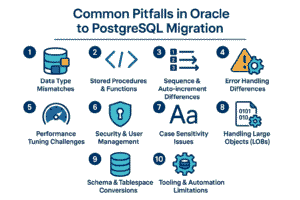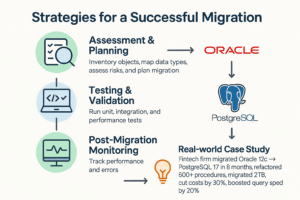Common Pitfalls in Oracle to PostgreSQL Migration
Migrating from Oracle to PostgreSQL is becoming increasingly popular due to PostgreSQL’s open-source nature, flexibility, and powerful features. However, despite its advantages, this migration journey is fraught with challenges that can derail projects if not carefully planned. Whether you’re moving a small application or a complex enterprise system, understanding the common pitfalls is crucial to a successful migration.
This article explores the top issues organizations face when migrating from Oracle to PostgreSQL. We’ll dive deep into architectural differences, provide expert tips to overcome common hurdles, and share a real-world case study to illustrate best practices.
Understanding Oracle and PostgreSQL Differences
Architectural Differences
Oracle is a commercial RDBMS with a rich feature set, while PostgreSQL is an open-source object-relational database known for its standards compliance. Key architectural differences include:
- Partitioning: Oracle offers advanced partitioning schemes natively. PostgreSQL supports partitioning but with different capabilities and sometimes manual workarounds.
- Replication: Oracle Data Guard is highly mature, whereas PostgreSQL uses streaming replication and logical replication, which may require additional tools for certain use cases.
- PL/SQL vs. PL/pgSQL: Oracle uses PL/SQL, which is more feature-rich compared to PostgreSQL’s PL/pgSQL, leading to compatibility challenges.
Licensing and Cost Considerations
Oracle’s licensing model is complex and expensive, often based on CPU usage. PostgreSQL is free and open-source, making it attractive for cost-cutting. However, savings can be offset by migration costs and training requirements.

Read 2 Mins: DMAP: Streamlining Oracle to PostgreSQL Migration with Innovative Features
1. Data Type Mismatches
One of the most frequent stumbling blocks is data type incompatibility. Oracle supports unique data types like NUMBER, RAW, and CLOB, which don’t have direct equivalents in PostgreSQL.
Example:
- Oracle’s NUMBER may map to PostgreSQL’s NUMERIC, but precision issues can arise.
- DATE and TIMESTAMP types might behave slightly differently, affecting date-based logic.
Tip: Use tools like ora2pg to identify and convert data types carefully.
2. Stored Procedures and Functions
PL/SQL code, rich in Oracle-specific constructs, can’t be directly ported. PostgreSQL’s PL/pgSQL has a different syntax and feature set.
Challenges include:
- Porting CURSOR operations
- Exception handling rewrites
- Rebuilding Oracle packages as separate functions
3. Sequence and Auto-increment Differences
Oracle uses sequences, while PostgreSQL traditionally used SERIAL and now prefers GENERATED AS IDENTITY. Ensuring that sequence values remain synchronized post-migration is essential.
Pitfall: Forgetting to migrate sequence start values can lead to primary key conflicts.
4. Error Handling Differences
Oracle and PostgreSQL handle errors and exceptions differently. Oracle allows fine-grained exception handling with named exceptions, while PostgreSQL’s error handling is less granular.
Example: WHEN OTHERS THEN in Oracle needs careful translation to PostgreSQL’s EXCEPTION blocks.
5. Performance Tuning Challenges
PostgreSQL’s query optimizer works differently than Oracle’s. Indexing strategies, execution plans, and vacuuming requirements all need to be revisited.
Tip: Don’t assume that Oracle’s indexing will work the same way—test and optimize in PostgreSQL.
6. Security and User Management
Oracle’s security model is more sophisticated out-of-the-box, with features like Virtual Private Database (VPD). PostgreSQL’s role-based access control (RBAC) is powerful but may need additional configurations to match Oracle’s granularity.
7. Case Sensitivity Issues
Oracle defaults to upper-case identifiers unless quoted, whereas PostgreSQL treats unquoted identifiers as lower-case. This can lead to confusing bugs during migration.
8. Handling Large Objects (LOBs)
Oracle’s CLOB and BLOB handling is mature. PostgreSQL supports LOBs but has different API requirements, which can break applications if not handled properly.
9. Schema and Tablespace Conversions
Oracle’s multi-schema design and tablespaces need to be carefully mapped in PostgreSQL, which handles tablespaces differently and doesn’t natively support some Oracle features.
10. Tooling and Automation Limitations
Although tools like ora2pg and AWS DMS exist, they don’t cover every nuance. Manual intervention is often required for complex migrations, especially around PL/SQL code.
Strategies for a Successful Migration

Assessment and Planning
A thorough assessment of the Oracle environment is essential. Build a migration plan that covers:
- Inventory of all database objects
- Data type mapping strategies
- Risk assessments and mitigation
Testing and Validation
Unit tests, integration tests, and performance tests are critical. Use dual-write techniques where feasible to validate data consistency between Oracle and PostgreSQL during the transition.
Post-Migration Monitoring
Implement robust monitoring using PostgreSQL’s pg_stat_activity and other tools to watch for performance bottlenecks and errors in the early stages post-migration.
Case Study: A Real-world Migration Example
A mid-size fintech company successfully migrated from Oracle 12c to PostgreSQL 14. The project took 8 months and involved:
- Refactoring 600+ stored procedures
- Migrating 2 TB of data using pg_dump and ora2pg
- Achieving a 30% reduction in operational costs
- Post-migration optimization that improved query performance by 20%
Get start for free – Book a Call – Newt Global Consulting LLC
FAQs
What is the biggest challenge in migrating from Oracle to PostgreSQL?
The biggest challenge is often converting PL/SQL code to PL/pgSQL, especially when the application is heavily reliant on stored procedures.
Are there tools that simplify Oracle to PostgreSQL migration?
Yes, tools like ora2pg, AWS DMS, and EnterpriseDB’s Migration Toolkit can simplify the process but typically require manual tweaks.
How does PostgreSQL handle PL/SQL code?
PostgreSQL doesn’t natively support PL/SQL. Code must be rewritten in PL/pgSQL or another supported procedural language.
What are the cost benefits of moving to PostgreSQL?
PostgreSQL eliminates licensing fees and can significantly reduce infrastructure costs, especially in cloud environments.
Can I migrate without downtime?
Zero-downtime migrations are challenging but possible with techniques like logical replication and dual-write strategies.
How do I ensure data integrity during migration?
Robust validation strategies, including checksum comparisons and dual writes, help ensure data integrity.
Conclusion
Migrating from Oracle to PostgreSQL offers immense benefits, from cost savings to increased flexibility. However, the journey is complex, with multiple technical pitfalls. By understanding the key challenges and implementing a structured migration strategy, organizations can achieve a smooth and successful transition.
Read 2 Mins – Easiest Ways to Migrate from Oracle – Database Comparison Guide
